Cold brew is a unique coffee brewing method that is never exposed to heat. It is made by steeping coarsely ground coffee beans in room temperature water for 12 to 24 hours, resulting in a less acidic, smooth, and strong coffee concentrate that’s then diluted with water or milk.
The cold brew craze has gone global in recent years, transforming cafe menus and home brewing routines alike. Market experts predict the industry will skyrocket to $1.63 billion by 2025, showing just how quickly this once-niche drink has become a worldwide favorite.
This stuff is seriously awesome, especially when you’re sweating buckets in the summer and need that caffeine fix without the heat. It tastes so much better and refreshing compared to your regular iced coffee.
How to Make Cold Brew Coffee at Home?
Making DIY Homemade cold brew coffee is a breeze, and I’m here to guide you through it. It’s a no-fuss process that just needs a little patience, but I promise, when you taste that first cool, revitalizing sip, you’ll understand why it’s absolutely worth the time.
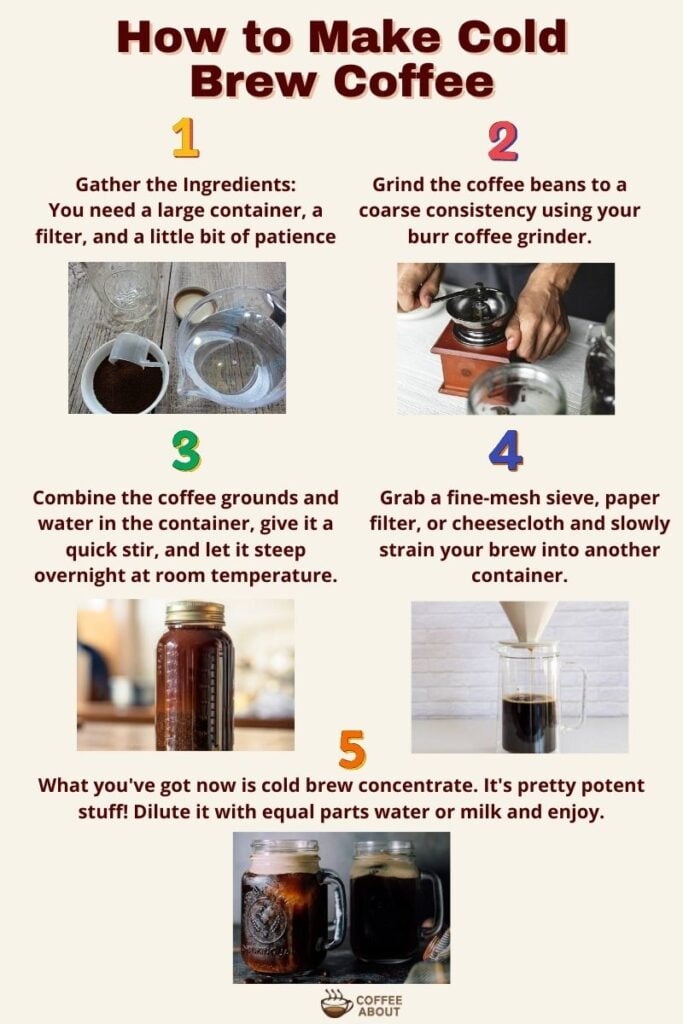
Step 1: Gather the Ingredients
The best thing about Cold Brew is you don’t need any coffee machine or electric device to make cold brew. You just need a large container, a filter, and a little bit of patience.
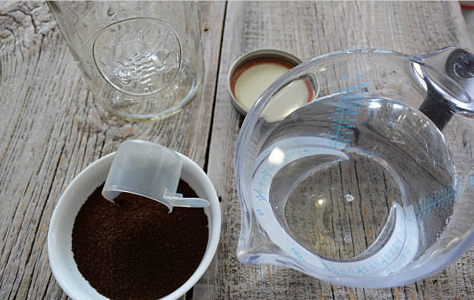
As an Amazon Associate, I earn commission from qualifying purchases.
What You’ll Need to Make Cold Brew Coffee?
1- Mason Jar or French Press:
A vessel to hold your brew while it steeps. Choose one that’s large enough for your desired batch size, with a tight-fitting lid. I like using French Press for Cold Brew because of its tight lid design and metal filters. Or you can buy a dedicated cold brew Coffee Maker with an airtight lid and built-in filters for convenience.
2- Coffee grounds:
Coarsely ground beans, similar to a French press grind.
3- Coffee filter or cloth:
A filter is needed to separate the coffee grounds from the liquid. You have the option of using fine-mesh sieves, paper coffee filters, cotton napkins or handkerchiefs, or reusable cloth filters such as cheesecloth.
Step 2: Grind The Coffee Beans
The first step is to Grind the coffee beans to a coarse consistency using your burr coffee grinder.
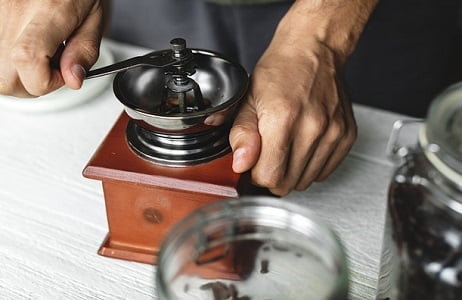
What’s the Best Grind Size for Cold Brew Coffee?
A coarse grind size is best for a cold brew with a texture of table salt or peppercorns — similar to what you’d use for a French press. The coarse grind allows water to flow freely around the grounds during the long steeping process, resulting in a smooth, full-bodied flavor without over-extraction.
Never use a fine grind for cold brew. It will clump when you add water, resulting in sediment in the coffee concentrate and a bitter, over-extracted taste.
I don’t recommend using pre-ground coffee beans as most pre-grounds are too fine for cold brew. Grab your favorite beans and grind ’em up, or hit up your local coffee shop for the good stuff.
What is the best ratio for cold brew coffee?
The best ratio for cold brew is 1 part coffee to 4 parts water. So, if you’ve got 1 cup of ground coffee, mix it with 4 cups of cold water. But hey, feel free to tweak this to make it stronger or milder – it’s your brew, after all! And don’t be intimidated by this high coffee ratio as we are going to dilute it with ice cubes or milk later.
Step 3: Combine the Coffee and water and Steep it Overnight
Combine the coffee grounds and water in the container, give it a quick stir, and let it steep overnight at room temperature.
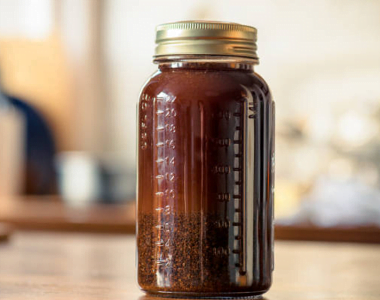
How long should you cold brew coffee
You should brew cold brew for at least 12-24 hours. The longer it steeps, the stronger your brew gets. Don’t rush it by going under 12 hours, or you’ll end up with a weak, under-extracted brew. And, don’t let it go wild past 24 hours, or it’ll turn overly bitter.
It’s all about finding that sweet spot that works for your taste buds. Maybe you’re a 12-hour person, or maybe you like it strong at 24 hours. Play around with it and see what gets you that perfect cup!
Step 4: Strain the coffee
Once you’ve waited (im)patiently, it’s time to strain. If you used a French press, just plunge and pour. Otherwise, grab a fine-mesh sieve, paper filter, or cheesecloth and slowly strain your brew into another container. Take your time here – rushing can lead to grounds in your final brew, and nobody wants a mouthful of sludge.
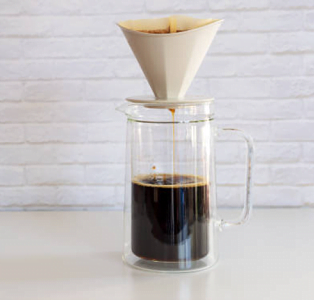
How to Serve Cold Brew Coffee?
What you’ve got now is cold brew concentrate. It’s pretty potent stuff! Most folks dilute it with equal parts water or milk before drinking. But hey, if you like it strong enough to wake the dead, go for it!
Here are some of my favorite ways to enjoy cold brew coffee.
Simply pour it over ice cubes: Pour cold brew concentrate into a glass full of ice cubes. It’s simple and lets you enjoy the coffee’s smooth and complex taste.
Add frothed milk and vanilla extract: Make a creamy cold brew latte by adding frothed milk, or go for a sweet twist with a teaspoon of vanilla extract for an iced vanilla latte.
Use maple syrup or simple syrup: Add maple or simple syrup to sweeten your cold brew.
Pour cold brew over ice cream: Pour your concentrate over a scoop of vanilla ice cream to make cold brew affogato. It’s a delightful dance of hot and cold, bitter and sweet.

Cold Brew Coffee Tips
Here are some of my exclusive tips to take your cold brew experience to the next level.
1. What’ the Best coffee to use for cold brew
The best coffee to use for Cold brew is a nice Medium dark or Dark roast. Sweetness is the most desirable taste characteristic of cold brew, and darker roasts have more sugars compared to lighter roasts, which gives your cold brew a delightfully sweet taste.
But here’s a tip: don’t go overboard with those extra dark roasts. I learned this the hard way. One time, I used an Italian roast, thinking more roast equals more flavor. Boy, was I wrong! It was so bitter, I almost swore off cold brew. You see, when beans are roasted too dark, they can release more bitter compounds during the long steeping process.
I’ve discovered that beans from Central and South America are cold brew champions. I’m talking Brazil, Colombia, and Guatemala – these regions produce beans with flavor profiles that shine in cold brew.
I’m a big fan of the Stone Street Cold Brew Colombian blend. It makes a tasty cold brew and has these awesome chocolaty and nutty flavors.
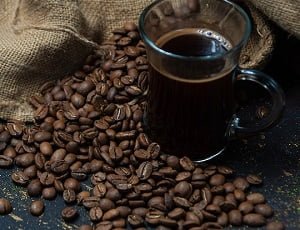
2. Can you steep Cold brew in a Refrigerator?
No, you should never cold brew in the refrigerator. That super cold environment in the fridge can stunt flavor extraction. You want those delicious coffee oils and compounds to really infuse into the water, and they do that best at room temperature.
I’ve seen a lot of people make this mistake and it can absolutely ruin your cold brew experience!
3. Use Quality Filtered water
Always use good quality filtered water for cold brew. Filtered water lets those subtle coffee notes shine through. Your cold brew is mostly water, so using bad-quality tap water can make it taste like, well, tap water.
4. Store in fridge and use for a week
Cold Brew can stay flavorful and fresh for 1 week when stored properly in a fridge. I always whip up a big batch on weekends and use it over a week. In the mornings, I just grab my concentrate, dilute it to my liking, and bam! Perfect cold brew every day without the daily grind.
What’s special about Cold Brew Coffee
Here are some of the reasons why I love Cold Brew Coffee.
1. Cafe-quality drinks at home
With cold brew, you’re not just making coffee; you’re crafting the same smooth, complex flavors you’d get at your favorite coffee shop. I love that I can have a barista-worthy drink without the line or the price tag.
2. Strong and full-bodied
The slow extraction makes cold brew stronger and more full-bodied than your average iced coffee.
3. No bitter flavors and less acidic
The cold process doesn’t extract those harsh, bitter compounds or as much acid. Cold Brew is a great option for individuals with acid sensitivity due to its lower acidity, making it gentler on the stomach and less likely to cause heartburn.
4. Refreshing in summer
Most people avoid hot coffee drinks in the summer. Cold brew is like an oasis in the heat. It’s cool, invigorating, and doesn’t dilute as the ice melts. It’s my go-to for a refreshing caffeine fix on a scorching day.
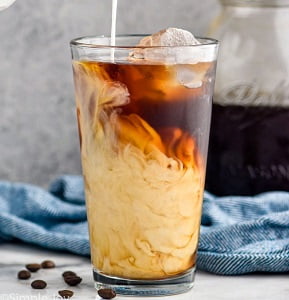
Cold Brew vs Iced Coffee – What’s the Difference?
The main difference between cold brew and iced coffee is in the brewing method. Iced coffee is essentially hot coffee that’s brewed using traditional methods – like drip or espresso – and then chilled and served over ice. While cold brew is made by steeping coarsely ground coffee at room-temperature water for an extended period.
Cold brew’s long, cool extraction process results in a coffee that’s less acidic and less bitter than normal iced coffee. It has a smoother, sweeter taste with more pronounced chocolate and nutty notes. The cold brew is typically stronger in both flavor and caffeine content due to the higher coffee-to-water ratio and longer brewing time.
Iced coffee can be more acidic and watery, especially if it’s not brewed strong enough to account for dilution from the ice. And it loses flavor faster as the ice melts.
Read guides on other coffee brewing methods
- How to make Turkish Coffee
- How to use a Moka Pot
- How to make Pour Over Coffee
- How to make Vietnamese Coffee
- How to Make Coffee in a Percolator
- What is Greek Coffee
- 14 different coffee brewing methods
FAQs
Can you heat up Cold Brew?
Cold brew is ideally crafted for chilled coffee beverages, but you can enjoy its smooth, less acidic flavor profile in a hot drink. However, I wouldn’t recommend directly heating cold brew concentrate as it can make your drink burnt and bitter. Instead, try adding very hot water to your cold brew concentrate in a 1:1 ratio. This method, similar to making an Americano, preserves the cold brew’s unique taste while providing the warmth you desire.
Can you make Cold Brew with fine Coffee grounds?
While the ideal cold brew uses coarse grounds to prevent over-extraction and bitterness, you can adapt if you only have fine grounds available. In this case, reduce your steeping time to 6-10 hours to avoid too much bitterness, and use a proper paper filter instead of a mesh strainer to prevent grit in your final brew. However, keep in mind that this may result in a slightly different flavor profile than traditional cold brew, so it’s best to use coarse grounds when possible.
How much caffeine is in cold brew coffee?
A typical 16 oz serving of cold brew coffee contains around 200 mg of caffeine. However, the actual caffeine content can vary widely based on the type of coffee beans, the coffee-to-water ratio used during brewing, and how much you dilute the concentrate before drinking.
Homemade Cold Brew Coffee Recipe
Equipment
- Mason Jar or French Press
- Coffee Filter
- Coffee grinder
Ingredients
- 1 cup Filtered Water
- 1/4 cup Coffee Grounds
Instructions
- Grind the Beans: Grind the coffee beans to a coarse consistency using your burr coffee grinder.
- Combine the Coffee and water: Combine the coffee grounds and water in the container and give it a quick stir. Use 1:4 Coffee to water ratio for a strong cold brew concentrate.
- Let it Steep: Cover the container with the lid and Let the mixture steep for 12-24 hours at room temperature.
- Filter the Cold Brew: Grab a fine-mesh sieve, paper filter, or cheesecloth and slowly strain your brew into another container.
- Serve and Enjoy: What you've got now is cold brew concentrate. It's pretty potent stuff! Dilute it with equal parts water or milk and enjoy.

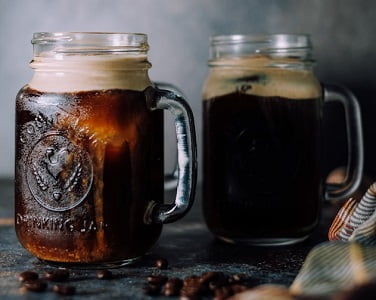



This cold brew guide is awesome! I’ve been wanting to try making it at home. Gonna grab some coarse grounds and give it a shot this weekend.
Finally a recipe that works! Made a batch on Sunday. Still drinking it on Wednesday. Love how long it lasts. The chocolate notes really come through with this method.